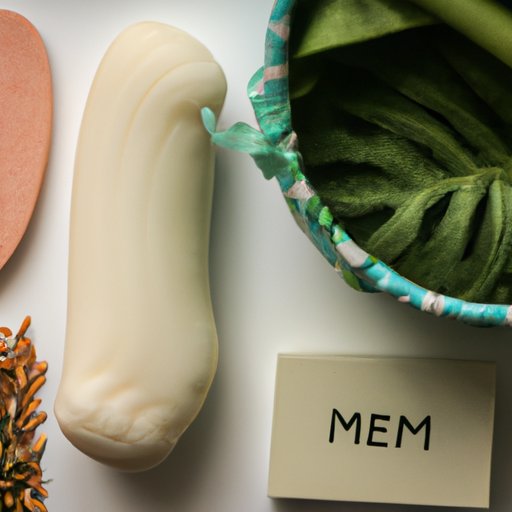Introduction
Menstruation is a natural and normal process for the vast majority of those with uteruses, yet it continues to be a topic that is often shrouded in taboo and stigma. However, for many people, menstruation can be a challenging and even painful time. This article aims to provide helpful information and advice for navigating your monthly cycle, from managing PMS symptoms, to choosing the right menstrual products, to promoting mental health and wellbeing during menstruation.
Navigating Your Monthly Cycle: Tips and Tricks for PMS and Period Relief
A. Overview of the menstrual cycle and PMS
The menstrual cycle is the monthly process that occurs in the body of those with uteruses, in preparation for potential pregnancy. This cycle involves the release of an egg from the ovaries, the thickening of the uterus lining, and its shedding if fertilisation does not occur. PMS (premenstrual syndrome) is a term used to describe a collection of physical and emotional symptoms that some people experience in the lead-up to menstruation. These symptoms can include mood changes, bloating, breast tenderness, and cramps.
B. Tips for managing PMS symptoms
While PMS can be a frustrating and uncomfortable experience, there are many ways to alleviate symptoms:
i. Lifestyle changes (diet, exercise, sleep)
Incorporating healthy habits into your lifestyle, such as regular exercise, a balanced diet, and adequate sleep, can greatly benefit overall menstrual health and help alleviate PMS symptoms.
ii. Over-the-counter remedies
Over-the-counter pain relief medications, such as ibuprofen or acetaminophen, can help relieve physical symptoms like cramps and headaches. Non-medicinal supplements such as evening primrose oil or magnesium supplements have been linked to PMS symptom reduction as well.
iii. Alternative treatments (such as acupuncture)
Some people find alternative therapies, such as acupuncture, or chiropractic adjustments useful in managing PMS symptoms, among other types of treatments like massage or reiki.
C. Recommendations for period relief
For many people, menstruation brings physical discomfort and inconvenience. However, there are a variety of ways to manage period symptoms and promote relief:
i. Hot and cold therapy
Heating pads, hot water bottles, and warm baths can help relieve cramps, while applying an ice pack to the lower abdomen can help reduce swelling and discomfort. You can make a reusable heat pad by simply filling a sock with dry, uncooked rice and microwaving it for 30-45 seconds to help soothe cramps.
ii. Pain relief mechanisms
As with PMS, over-the-counter pain relief medication or supplements can be helpful for managing cramps or headaches. Topical pain relief balms and salves can also provide relief when applied to the lower abdomen.
iii. Applicable products (such as heat pads, menstrual cups)
Choosing the right menstrual products can make a world of difference. Menstrual cups can be more comfortable and convenient than pads or tampons, as well as cost less over time. Reusable heat pads can also provide physical relief and can again be a long-lasting investment.

From Cramps to Comfort: Natural Remedies to Ease Menstrual Pain
A. Description of menstrual cramps and associated pain
Menstrual cramps, also known as dysmenorrhea, occur when the uterus contracts in order to shed the lining. This causes sensations of pain and discomfort in the lower abdomen, lower back, and even along the legs. Cramps can range from mild to severe, and can greatly affect daily functionality.
B. Natural remedies for menstrual pain
Those who prefer a more natural approach to pain relief can consider the following remedies:
i. Herbal remedies (such as ginger and chamomile)
Ginger and chamomile tea have been found to potentially help alleviate menstrual cramps and overall menstrual discomfort.
ii. Essential oils and aromatherapy
Aromatherapy and the use of essential oils have also been linked to a soothing of menstrual discomfort, ranging from a simple scent usage up to full body massage with certain oils.
iii. Yoga and other relaxation techniques
Gentle exercise and relaxation techniques, like yoga, can help alleviate symptoms of menstrual cramps, along with the added benefit of helping to promote mental health and relaxation during the cycle.
C. Practical tips for implementing natural remedies
For those considering natural remedies to aid in discomfort relief, there are many ways to incorporate these methods into your routine. Some recommendations include drinking herbal tea, diffusing essential oils, and practicing yoga, all of which are easily implemented into your daily routine.
Surviving Your Workweek While on Your Period: Coping Strategies for Busy Women
A. Explanation of common challenges during workweek with periods
Menstruating while working can be a difficult experience, with physical discomfort and the emotional impact of PMS symptoms, productivity can take a hit.
B. Coping strategies for improving productivity during period
Here are some recommendations for maintaining productivity and wellbeing during menstruation:
i. Preparation
Be sure to bring backup supplies to work, whether that’s menstrual pads, tampons, or a menstrual cup, plus any pain relief medication or essential oils. Additionally planning out menstrual-centric items such as hygiene boxes or snacks could also be helpful.
ii. Managing symptoms
It’s important to listen to your body and take the necessary steps to manage any physical or emotional symptoms, such as taking a break for a gentle stretch or ensuring you get enough water.
iii. Communication with coworkers/bosses
Communicating beforehand as well as during your workweek with coworkers and managers on how to adequately ensure that you are comfortable and able to work is also essential.
C. Recommendations for maintaining self-care during workweek
Prioritizing self-care is still important, especially during menstruation, and as such can involve prioritizing regular breaks, meals and hydration which might take a back seat when trying to keep the work ball rolling.
Maximizing Your Workout During Your Period: How to Stay Active and Comfortable
A. Overview of concerns for working out during period
Many people may wonder if it’s safe to exercise during menstruation, with concerns about physical discomfort, changes in energy levels, and possible leakage of menstrual products.
B. Benefits of exercise during period
The benefits of exercise during menstruation include the reduction of cramps, improved mood, and increased energy levels.
C. Tips for maximizing comfort during workouts
To maximize comfort while exercising during menstruation, consider the following tips:
i. Appropriate types of exercises
Try lower-impact routines such as dance, yoga, or Pilates and decide on what type of exercise works best for you.
ii. Clothing choices
Comfortable and breathable clothing, especially in the areas where menstrual products might need to be used. There are even menstruation-friendly workout leggings available on the market!
iii. Hydration and nutrition recommendations
Stay hydrated and consider ensuring your nutritional needs are being met.
Period Product Reviews: A Comprehensive Guide to Choosing the Right Menstrual Supplies
A. Comparison of period product options (pads, tampons, cups, etc.)
There are several types of menstrual products available on the market today: disposable pads, tampons, and menstrual cups, with sustainable options also becoming increasingly popular.
B. Evaluation of different product brands
Brand recommendations will vary depending on preference, but it is important to seek out a trusted company for whatever menstrual product you ultimately decide to use.
C. Cost analysis and sustainability considerations
It’s essential to consider both the cost and environmental impacts of the products you use and select alternatives which, over time, can be most environmentally friendly.
Periods and Mental Health: How Hormones Affect Your Mood and What You Can Do About It
A. Overview of hormonal fluctuations and mental health
Hormonal fluctuations, particularly during menstruation, can have a significant impact on mental health, leading to mood changes, anxiety, and depression.
B. Common emotional challenges during menstrual cycle
Emotional challenges during the hormonal changes surrounding menstruation can range from simple mood swings to more complex mental health issues such as depression and anxiety.
C. Coping mechanisms for managing emotions during period
Several approaches can help ease the emotional impact of menstruation:
i. Ways to manage stress
Practicing effective self-care during this time, and even seeking out counseling or therapy, can be helpful in managing stress.
ii. Techniques to improve mood (such as exercise and meditation)
Exercising, meditating, or journaling can all be beneficial for improving mood, stress reduction or simply increasing positivity.
iii. Counseling or professional support options
If you are struggling with a more complex mental health problem, seeking help from a mental health professional such as a therapist or counselor can be beneficial, as they are able to provide personalized support and coping strategies.
Conclusion
From managing PMS symptoms and period pain with natural remedies to choosing the right menstrual products and prioritizing self-care during work weeks, there are many ways to navigate your monthly cycle. Remembering to incorporate physical and mental care during this time can go a long way to make it more comfortable and even enjoyable.
If you’re struggling to manage your period, talk to a trusted health provider to identify the best options for you.
Relevant resources for further information and support on menstrual health:
- Planned Parenthood
- The American College of Obstetricians and Gynecologists
- Mayo Clinic
- Womenshealth.
(Note: Is this article not meeting your expectations? Do you have knowledge or insights to share? Unlock new opportunities and expand your reach by joining our authors team. Click Registration to join us and share your expertise with our readers.)
